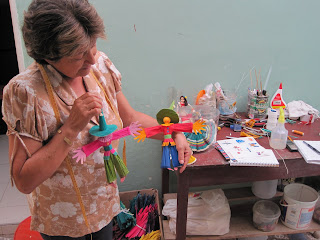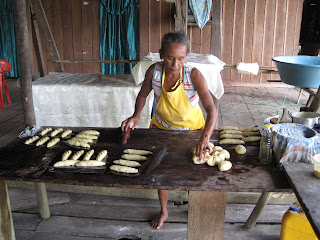

Last days in Ibague were spent visiting artisan groups working with mimbre fiber, guadua (like bamboo), and cornhusks. We will be working with artisans in another community, Neiba, for a week in early July who work primarily with leather and natural fibers.
 We are currently in Cali, the salsa capital of colombia. however, every monday since arriving in colombia has been a holiday... so on sundays and mondays nothing is open with the exception of the mall and the bingo halls which have kept us successfully occupied. They are really friendly and serve free juices, provided you keep playing. Although we have yet to hit the jackpot, the potential for funding our remaining travels through our bingo earnings keeps hope alive.
We are currently in Cali, the salsa capital of colombia. however, every monday since arriving in colombia has been a holiday... so on sundays and mondays nothing is open with the exception of the mall and the bingo halls which have kept us successfully occupied. They are really friendly and serve free juices, provided you keep playing. Although we have yet to hit the jackpot, the potential for funding our remaining travels through our bingo earnings keeps hope alive.




We arrived in cali last night after a week at Juan de Dios, a small beach community surrounded by pure jungle an hour boat ride from the nearest port city, Buenaventura. we hiked in loaner rubber boots to visit the nearest neighbor and ate the fresh bread she bakes to sell in a town, an hour boat ride away. we kayaked through mangroves and out into the ocean to visit an old man squatting in the remnants of a hotel that was built 20 years ago whose construction was never completed. we climbed the roof there and saw 180 degrees of pure jungle behind us and 180 degrees of ocean before us with no signs of homes or infrastructure such as electricity or cell phone towers. We slept under a thatched roof on a palm leaf floor under mosquito netting and experienced the nightly torrential jungle rains (most rainfall in this region than anywhere else in the world). We traveled with a woman we met and her friend, who sang amazing songs everynight around bonfires while playing her gaita (an indigenous carribean wind instrument), and there were 4 other colombians there and a family who runs the place. We shared meals of fish that was caught fresh every day and rice and patacones (by candlelight) and every meal was complimented with conversations revolving around all the colombian fruits, desserts, and other typical dishes we have to try while here. All the music we have to listen to. and all the places we must visit.
So, this is my romanticized version of the experience. The truth is this region of Valle de Cauca is known for having some of the highest numbers of displaced peoples in all of colombia due to mining, fumigation of coca farms, and other political reasons. The area is highly patrolled by military. Most people we met in the region were not originally from that area. Life there is hard but the people we met were full of spirit and stories as well.






